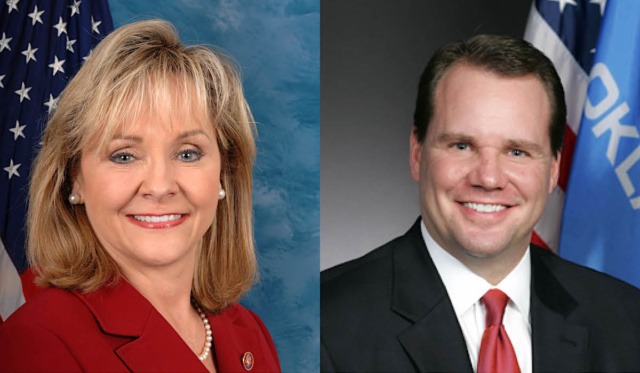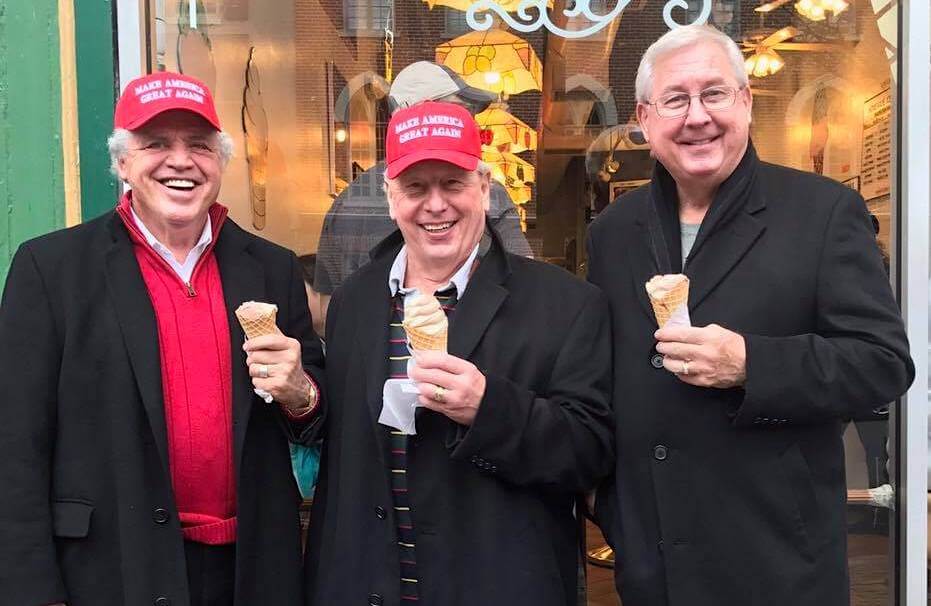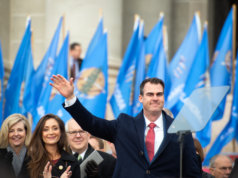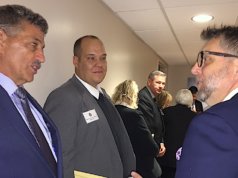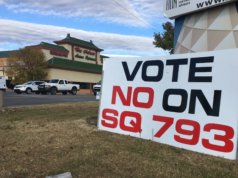
Last we mentioned Oklahoma Lt. Gov. Todd Lamb on NonDoc, I was writing about Gary Richardson’s amusing gun giveaway and impending announcement of a 2018 gubernatorial campaign.
Lamb, of course, has been functionally running for governor since being elected as lieutenant governor in 2010.
“That’s what lieutenant governors do,” OU political science professor Keith Gaddie told me at the start of this month.
He noted that Lamb could be dogged by Gov. Mary Fallin’s low approval ratings and Oklahoma’s generally poor fiscal condition, both of which seem to be getting worse. But Gaddie said tying Lamb to Oklahoma’s recent governmental shortcomings would be a tough case for even an attorney like Richardson to make.
“What are you going to tie him to? What policy decision has Lamb made?” Gaddie asked. “That’s the one thing about lieutenant governor: Nobody knows what you do, nobody knows that you did it, but they know you did something, and they know you’re the lieutenant governor.”
RELATED
Gary Richardson preparing run for Oklahoma governor by William W. Savage III
But Thursday, Lamb took an extremely bold step to distance himself from the current administration. In a 10 a.m. press release, the man who would have become governor had Fallin landed a Trump-administration appointment announced his resignation from her cabinet.
“Gov. Fallin deserves to have someone in her cabinet who can be a strong advocate for her agenda, and that is something I am unwilling to do,” Lamb said in a statement. “While I respect the determination with which Gov. Fallin met her obligation to present a balanced budget to the Legislature, I cannot support her proposed tax increases.”
While it’s not shocking to see a man running for governor oppose tax increases, it is surprising to see a sitting lieutenant governor drop the state’s elected leader within his own party like a sack of rotting potatoes.
What would Lamb do?
Lamb’s cabinet resignation — which does not change his status as lieutenant governor/chief ribbon cutter — came nearly 26 hours after likely 2018 GOP primary opponent Richardson released a Facebook video blasting Fallin’s sales-tax-on-services proposal. The video, which blows through an entire hard-drive’s worth of stock images while a voice rattles off services that could face taxation, has been shared more than 1,100 times.
In essence, Lamb acted Thursday to join Richardson — and, ironically, House Minority Leader and fellow gubernatorial prospect Scott Inman (D-Del City) — in opposition to Fallin’s bold and controversial proposal.
“This proposal will adversely harm Oklahoma’s small businesses and families, especially those in our service industry,” Lamb continued in a statement that could give Republican legislators cover to buck Fallin’s proposition. “While Gov. Fallin and I have disagreed on issues from time-to-time, our differences on this important topic are so significant they preclude me from continuing to serve on her cabinet.”
Richardson took note and issued his own public statement, commending Lamb’s decision but subtly pointing out the timeline.
“I am glad that Lt. Gov. Lamb has finally decided to follow my call to oppose Gov. Fallin’s proposed tax on the service industry,” Richardson wrote on Facebook.
But the question of what Lamb would do if he were governor — which would require him to propose an executive budget like Fallin has each of the past seven years — remains wholly unanswered.
Not an interview
Since June, Lamb and his staff have ignored my requests to profile him on NonDoc. Through mutual friends and chief of staff Keith Beall, I even relayed an agreement to stay away from questions about Lamb’s 2018 aspirations, and I promised that our reporter would focus his article primarily on Lamb’s fascinating story (he is a former Secret Service agent, among other things).
An interview with Beall on Thursday about Lamb’s announcement is the best I’ve been able to do so far. He said Lamb learned of Fallin’s revenue proposals at the State of the State address “like you and everyone else.”
“I think the lieutenant governor, since the State of the State, had had discussions with small-business owners. It’s something that has evolved since the State of the State,” Beall said. “He wasn’t involved in the writing of this budget.”
Asked whether Lamb supports or opposes Fallin’s proposed cigarette and fuel taxes, Beall said he was not sure and would provide an answer later Thursday.
As of Monday morning, Beall has not answered that question.
Lamb-led E Foundation looking far down road
Of particular interest to me and several NonDoc readers has been Todd Lamb’s E Foundation for Oklahoma, an organization launched in November 2015 as a way to create “a plan of action to organize and prioritize policies, resources and talent in order to promote growth in the economy and improve the quality of life for all Oklahomans.”
Sixteen months after its launch, however, the E Foundation has issued 64 tweets, zero reports, zero plans and zero policy proposals about its six pillars of focus: education, energy, efficiency, entrepreneurship, enduring freedom and exporting.
But that’s about to change.
“We’ll start rolling all of those out here, with the first one being ‘enduring freedom,’ next month,” Michael Carnuccio, president and CEO of the E Foundation, said. “We’re actually doing a kind of round-table meeting with a lot of the leaders involved in the military and defense in Oklahoma. And after that, then we’ll be talking about the specifics of that pillar.”
Carnuccio spoke to me the day Lamb withdrew from Fallin’s cabinet, and he emphasized that he couldn’t comment on the lieutenant governor’s decision nor his potential 2018 campaign strategy. But he did offer an insider’s look at how Lamb views issues facing Oklahoma that can’t be solved in one session or budget cycle.
“I find him to be very substantive, very interested. In our conversations, he doesn’t spend a lot of time on the right now,” said Carnuccio, the former head of the Oklahoma Council of Public Affairs. “I think what it says to me from listening to discussions we have, that the board has and what he does as chairman, I think Lamb is focused on getting it right and moving the state forward.
“How that translates to anything in the future, I personally would be surprised if that’s not good for Oklahoma.”
And therein lies an interesting story line to watch with Lamb and the E Foundation. As the foundation begins rolling out thoroughly researched components of its 20-year plan for Oklahoma, its chairman is positioning himself for a potential gubernatorial run.
On the one hand, that means Lamb could walk into the governor’s mansion circa 2019 with a robust vision and detailed blueprint for how he’d like to shape critical state sectors during his term(s).
On the other, the public and the press will likely view Lamb’s E Foundation initiatives with a healthy dose of skepticism. Any person running for governor always seeks free publicity yet refrains from going on the record about specific policy proposals, when possible.
If the idea is for Lamb to focus a decade or two down the road while remaining mum on how he’d balance Oklahoma’s brutal budget in the here and now, he might win a race for governor, but he might be stuck with the same revenue conundrum currently chained around Fallin’s ankles.
Here’s hoping someone, somewhere can find a key.









